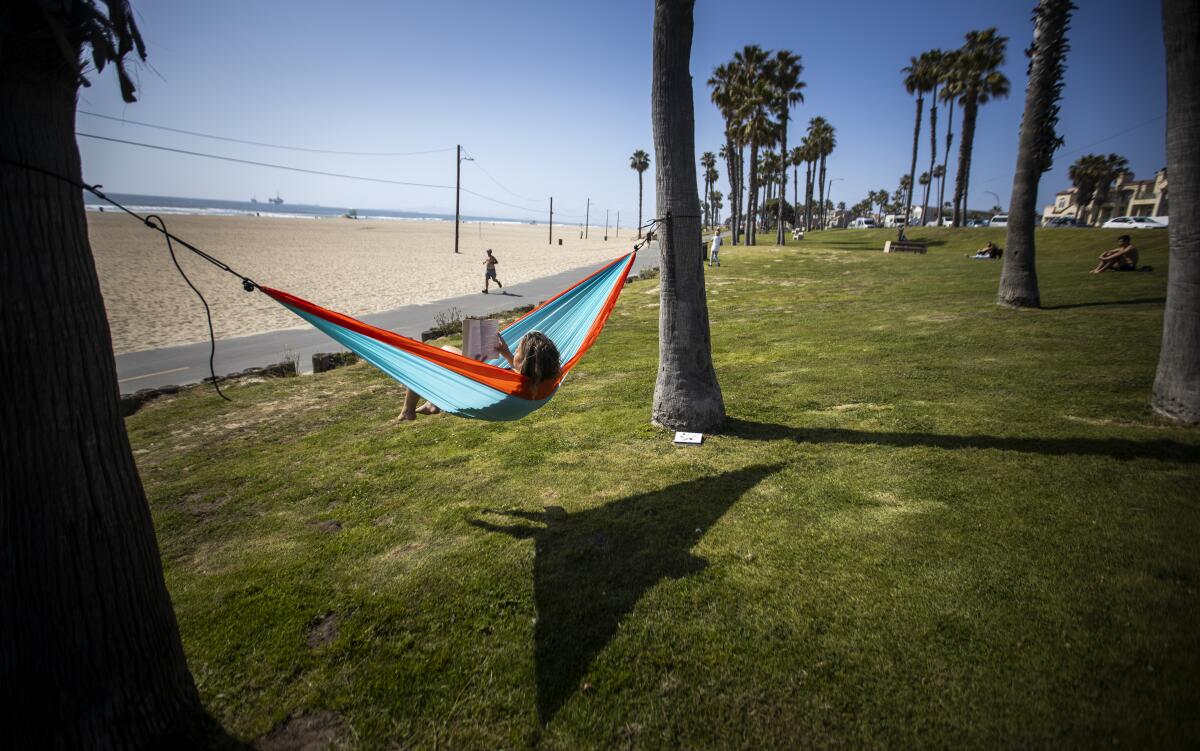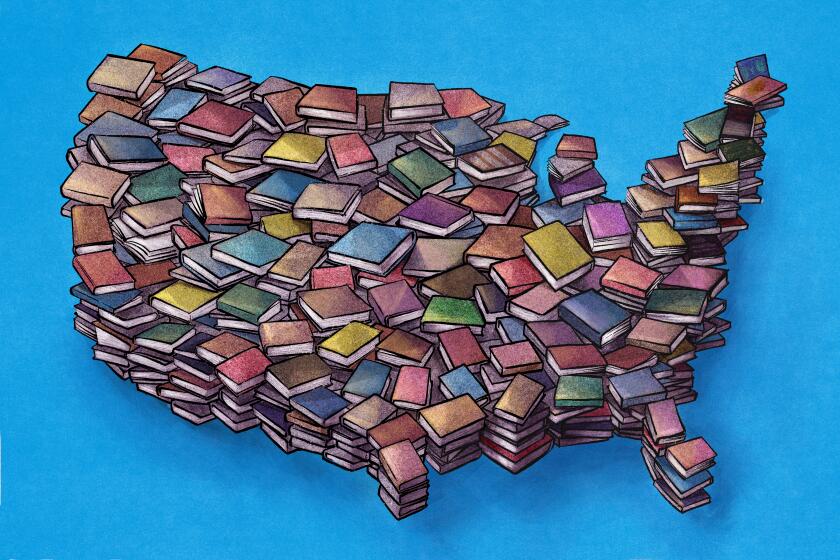The ideal beach read? It’s not what you’d expect

- Share via
I’ve been a reader for nearly all of my life, yet I always feel perplexed at the beginning of summer, when the term “beach reads” enters the chat. During the year’s colder months, bookworms are envisioned as contemplative folk who drink hot tea and snuggle up in leather-bound chairs with the complete works of the Brontë sisters. But as summer begins, our tea is supposed to become iced, our chairs foldable, and the Brontës are exchanged for something light, romantic, fizzy and fun.
Yet I seem to be off schedule. As a college professor, I prefer to dig into lighthearted reads during the school year, when I need a break from reality. The semester that just ended was especially challenging, so relaxing with rom-coms and other books often categorized as beach reads was just the kind of entertainment my brain deserved at the end of each day. I felt slightly out of the loop hearing other readers discuss the weighty books of the season, but I knew I needed the escape lighter books gave me.
Here are 20 upcoming books — publishing between late May and August — that we recommend to kick off the summer reading season.
Yet as the sun begins to scorch, I find myself drawn to those heavier reads. Perhaps because I have more mental bandwidth, what I want as I huddle beneath a beach umbrella is an honest-to-goodness downer, something thick, well-written and very sad. I want to see tragic mistakes and learn meaningful lessons. In the summer, when it seems like other readers want books with a happy ending, I want to rue humanity’s foibles while walking along the shore … as I dig into a large ice cream cone.
I can trace this back to a summertime trip I took to London with my father when I was 21. On the flight from Pittsburgh, I dived into Jon Krakauer’s “Into Thin Air,” the deeply unsettling account of a 1996 tragedy on Mount Everest, which left five people dead and many others guilt-ridden. It was, as my students say, unputdownable, and I read into the night even after we checked into our hotel, thoroughly messing up my sleep schedule for the rest of the vacation.
Over five years, I read 1,001 novels to hear the voices that fill this country. These books showed me that the places of American fiction can’t be divided into blue or red states.
Groggy as I was, I couldn’t stop thinking about the terrible choices that the book described and how fragile life seemed in the wake of reading it. I felt chastened by the knowledge of how close we often are to ruin, which made the sights and sounds of my trip more vivid. The tragedies in the book gave me the sensation of somehow being more alive. And my hubris was checked. Let others climb mountains; I was happy to explore a decadent Eton Mess.
Since then, I’ve made a habit of reading downers in the summer. Dave Cullen’s astonishingly well-reported and chilling “Columbine” accompanied me on a Parisian jaunt. I took Sheri Fink’s “Five Days at Memorial,” a masterpiece about a hospital in New Orleans before, during and after Hurricane Katrina, with me on a family trip through the Maritime Provinces of Canada. I delved into Michael Shaara’s Gettysburg-set novel “The Killer Angels” on a beach vacation in Cape May, N.J., ruminating on Pickett’s Charge while I searched for sea glass.
Each of these books drew me in with their exhaustive research, deep knowledge of place and expert craftsmanship. And I learned! The facts of each tragedy, of course, but also about the darkness of the human soul and, in moments, the lights of hope that break through that cloud cover. While I didn’t envy those characters their calamities, I did feel grateful for coming as close as I could to witnessing what they had endured, and how (if) they survived. And then I left those worlds behind for the consolations of Skee-ball or barbecue.
The author, who died on Monday, used fiction to get at the truth of private grief and doubt.
I realize now that my summer reads may be out of step with many others’, but we all are, I hope, transported by our picks, because that’s what good literature can do.
So this year I’ll be hunkering down on the beach with a book about the opioid crisis while others along the shore are reading celebrity memoirs and romance novels. But instead of letting my seasonal preferences make me feel like an outsider, perhaps I’ll take note of what my neighbors are reading and keep a list for the fall. Then, when another semester begins and my work life becomes more stressful, I’ll know exactly which book to escape into for fun and froth … as I pull my afghan up to my chin and take a sip of piping hot tea.
Shannon Reed is a professor and the director of undergraduate studies for the writing program at the University of Pittsburgh. Her latest book is “Why We Read: On Bookworms, Libraries, and Just One More Page Before Lights Out.”
More to Read
A cure for the common opinion
Get thought-provoking perspectives with our weekly newsletter.
You may occasionally receive promotional content from the Los Angeles Times.








